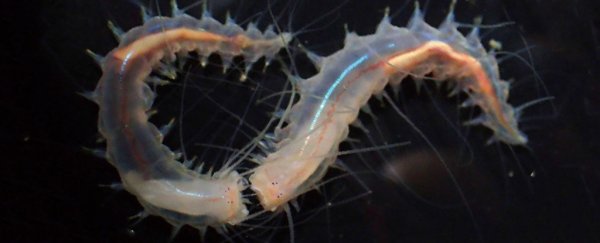When you think of loud sounds you probably imagine earsplitting screams or whole-body-vibrating booms. Not necessarily the abrupt pop that belongs to a tiny 29-millimetre marine worm (Leocratides kimuraorum).
But when marine biologist Ryutaro Goto from Kyoto University and colleagues measured the sounds made by these polychaete worms they came in at a whopping 157 decibels. For context, we can hear sounds as low as 10 decibels, but by around 130 decibels sounds can become painful and damaging to our ears.
"[This is] comparable to [sounds] made by snapping shrimps, which are among the most intense biological sounds that have been measured in the sea," the researchers explain in their paper.
The shrimp in question (Synalpheus paraneomeris) use their 189 decibel snaps to stun prey - a noise capable of breaking glass.
While this sponge-dwelling worm's fearsome pressure wave isn't quite as impressive, Goto and colleagues were surprised by the racket it makes, having thought the creatures were silent.
The researchers point out that soft-bodied animals weren't known to make loud sounds - at least not until the team took these polychaetes back to the lab and witnessed the popping noises their little mouths make.
"A loud pop may be a byproduct of the rapid mouth attack, but it may also aid intraspecific communication," the researchers speculate.
They think the worms produce this battle pop by opening their thick pharyngeal muscles to create a cavity bubble before forcefully exploding it open.
Only recently described in 2017, these worms stake out holes in sea sponges along the Pacific coast of Japan, where they wait for prey and fiercely defend their turf from rivals.
Just look at them go at it:

Hmm. Maybe it's more impressive in person?
The full investigation of L. kimuraorum's sound can be found in Current Biology.
